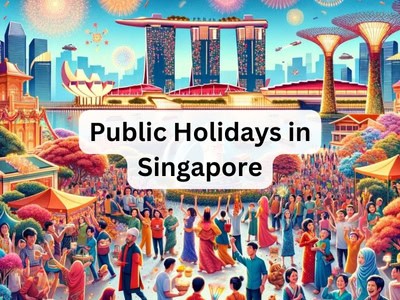This post is also available in:
![]() 简体中文 (Chinese (Simplified))
简体中文 (Chinese (Simplified))
Employment and Payment Rules During Public Holidays in Singapore
 There are 11 public holidays in Singapore. Therefore, you are entitled to 11 paid public holidays if you are covered by the Employment act. The 11 gazetted holidays are listed below on chronological order:
There are 11 public holidays in Singapore. Therefore, you are entitled to 11 paid public holidays if you are covered by the Employment act. The 11 gazetted holidays are listed below on chronological order:
- New Year’s Day: January 1.
- 1st Day of Chinese New Year: January or February
- 2nd Day of Chinese New Year: January or February
- Hari Raya Puasa: May or June
- Hari Raya Haji: July or August
- Good Friday: Mostly April and March
- Labor Day: May 1
- Vesak Day: Mostly May
- National Day: August 9 each year
- Deepavali: October or November
- Christmas Day: December 25
Holiday Pay Entitlement
You will be paid your gross pay on public holidays in Singapore if:
- You work on a working day immediately before or after a holiday
- Also, you are on approved leave on the day immediately before or after a holiday
- The holiday did not fall on your approved unpaid leave
Example:
- If you are on approved unpaid leave on 24 December, you are still entitled to a paid public holiday on 25 December
- If you are on approved unpaid leave from 24 to 26 December, you are not entitled to a paid public holiday on 25 December
What Will Happen if You Work on Public Holidays in Singapore?
By default, if you work on a public holiday, you will be paid an extra day’s salary.
That said, if mutually agreed, you may get one of the following:
- An off-in-lieu
- Time-off in lieu for those who are not covered under Part IV of Employment Act
If your employer requires you to work on a public holiday, your employer should pay you an extra day of basic salary.
- As your monthly gross salary already include payment for the holiday, hence, you will only be paid an extra day’s pay.
- However, if you are absent without reason on the working date immediately before or after the holiday, you will not be entitled holiday pay. Hence, your employee can deduct one day’s gross pay from your monthly gross salary.
Please refer below for the different types of payment under different scenarios.
If you work on a public holiday that falls on your working day, your employer should pay you the following:
- An extra day of basic salary
- Gross salary for that holiday
- Overtime pay if your work beyond your normal working hours
If you work on a public holiday that falls on your non-working day, your employer should pay you the following:
- Overtime pay for extra hours on a non-working day
- An extra day of gross salary or off-in-lieu for the holiday
If you work on a public holiday that falls on your rest day, your employer should pay you the following:
- Payment for work done on a rest day
- Overtime pay if you work beyond your normal working hours
- Your next working day will be a paid holiday
Under the mutual consent of you and your employer, you will be compensated with a public holiday in lieu if you work on a public holiday.
What Happens If You Are Not Covered Under Part IV of Employment Act
If you are not covered under Part IV of the Employment Act, then you will be compensated with time off in lieu for working on a public holiday. The number of time-off hours will be mutually agreed to by you and your employer.
If there is no mutual agreement, your employer may decide on one of the following:
- Paying you an extra day of basic pay for one-day of work
- If you worked less than 4 hours (4 hours included) on a holiday, your employer will grant you 4 hours of off in lieu in a working day
- If you worked more than 4 hours on a holiday, your employer will grant you a full day off in lieu on a working day


